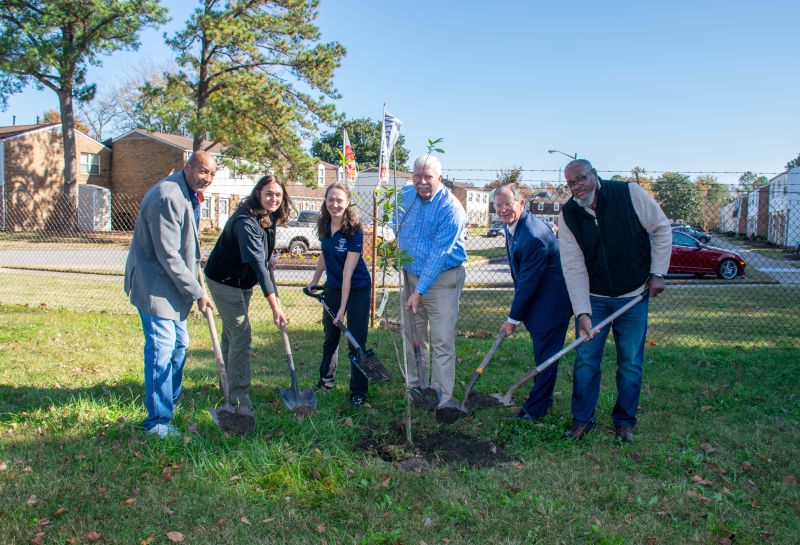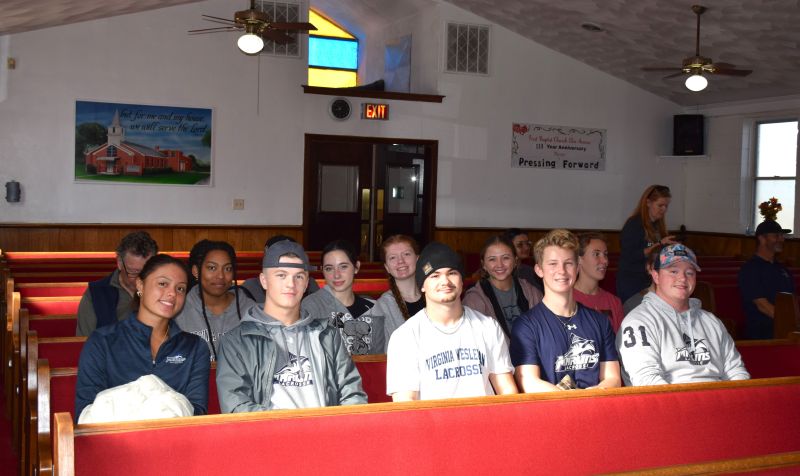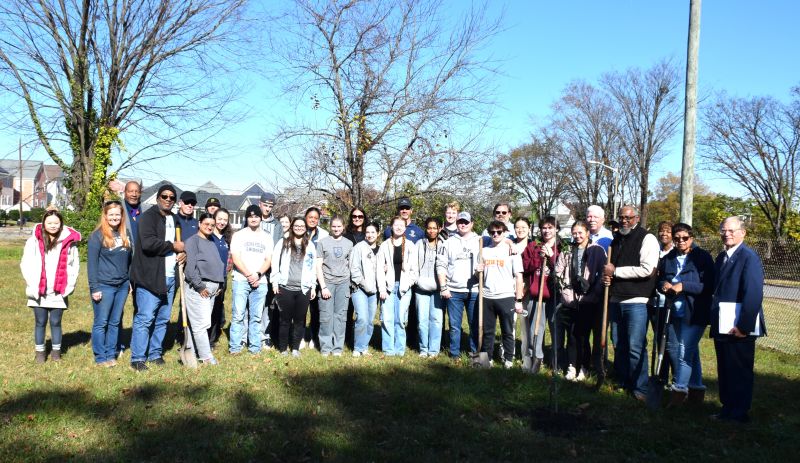Share this Story
Cool Down P-Town
Students, faculty, and community members plant dozens of trees and shrubs to help mitigate extreme heat in Portsmouth
University News | November 19, 2025
 Virginia Wesleyan University faculty, staff, and students joined community volunteers on November 14–15 for a large-scale tree-planting effort in Portsmouth as part of the Cool Down P-Town initiative. Over two days, participants planted more than 70 native trees and 35 native shrubs at Columbia Park and the Neighborhood Facility Recreation Center—and also distributed additional plants to local residents.
Virginia Wesleyan University faculty, staff, and students joined community volunteers on November 14–15 for a large-scale tree-planting effort in Portsmouth as part of the Cool Down P-Town initiative. Over two days, participants planted more than 70 native trees and 35 native shrubs at Columbia Park and the Neighborhood Facility Recreation Center—and also distributed additional plants to local residents.
The event marked the latest phase of VWU’s $222,000 grant, “Community-Based Urban Heat Island Mitigation in Portsmouth, VA,” funded by the Virginia Department of Forestry's Urban and Community Forestry program. The multi-year project aims to reduce extreme heat in vulnerable neighborhoods by mapping urban heat islands, identifying high-risk communities with GIS analysis, collaborating with residents to design solutions, and ultimately planting roughly 500 native trees and shrubs across the city.
Understanding the Heat
“Based on the study we conducted, we found that some areas of Portsmouth experience significantly higher temperatures than others due to low tree cover and extensive impervious surfaces,” said Dr. Elizabeth Malcolm, Professor of Ocean & Atmospheric Sciences and Director of Sustainability at VWU. “The data we collected helped us identify targeted interventions like this one that directly benefit the most vulnerable communities. Neighborhoods with dense asphalt and concrete recorded some of the hottest temperatures. These urban heat islands pose serious public health risks, especially for elderly residents, low-income communities, and individuals with preexisting health conditions.”
A Community-Focused Collaboration
This phase of planting was conducted in partnership with the City of Portsmouth—with most trees placed at Columbia Park and the Neighborhood Facility Recreation Center—and with First Baptist Church on Elm Avenue, which served as a central gathering point.

“This event represents the best of what collaboration can achieve,” said President Miller. “Through Cool Down P-Town, we are combining research, environmental stewardship, and community engagement to address the challenges of extreme heat. Faculty and students from VWU have worked closely with community partners to identify areas most affected by heat stress and to develop nature-based solutions like this tree-planting effort that will make a real difference for residents.”
Students Leading the Charge
On Saturday, VWU students and church volunteers returned to plant at First Baptist Church while another group formed a “Street Team for Climate Resilience.” Carrying trees and shovels, students walked through nearby neighborhoods to speak with residents about the benefits of urban tree canopy, raise awareness about the initiative, and plant trees where community members requested them.
In total, more than 40 VWU students and five faculty and staff members participated in the two-day effort. First-year students from the Batten Honors College HON 110 course, Contemporary Environmental Issues, were among those involved. Many undergraduate and graduate students have contributed to the initiative. This semester, Haley Cummins (Earth & Environmental Science major and Batten Honors College student) and Vanessa Davidson (Master of Environmental Studies student) have supported planning, implementation, and ongoing research. The City of Portsmouth’s Parks & Landscape Manager, Michael Phillips, also played an essential role in identifying planting locations and coordinating the city crews who prepared the sites.

Expanding Regional Impact
Complementing this work, Professor Maynard Schaus, Coordinator of Sustainability Management and VWU Professor of Biology and Environmental Science, recently secured a grant from the National Fish and Wildlife Foundation to plant trees across the Elizabeth River watershed, in Portsmouth and Norfolk. The first planting for that project took place earlier this month. Schaus, along with students and community partner Garry Harris, has also distributed dozens of trees at the Portsmouth Farmers’ Market and other community events to encourage residents to support environmental resilience at home.
A Hub for Resilience
First Baptist Church is serving as a “hub of resilience” for the community—a place not only for tree planting, but for advancing broader sustainability initiatives. The congregation will work with Harris on projects such as an energy audit and the development of a “creation care” committee. The broader effort, which Harris calls “Trees Across Portsmouth,” positions Cool Down P-Town as the first step in a long-term, community-driven strategy to combat extreme heat.
Together, these collaborative efforts demonstrate how science, education, and community engagement can create meaningful, lasting solutions to extreme heat in cities like Portsmouth and beyond.


